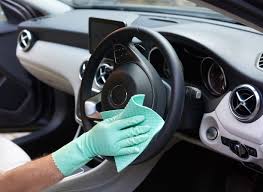Cleaning your car is a fast, simple, low cost job that might minimise the spread of coronavirus and keep loved ones safe. Handy if there are ‘essential’ trips that cannot be avoided. So, how might you clean your vehicle to minimise the spread of coronavirus?
- Clean first (then disinfect). It is hard to find disinfectant in the shops, so preserve resources and remove any typical dirt with standard vehicle cleaning products (or soapy water).
- Disinfect after cleaning. Isopropyl alcohol is among the disinfectants that might kill coronavirus in your car.
- Test disinfectant. Whatever disinfectant you choose, test it on a small, hidden part of each type of material in the car before applying throughout. Why? Because some disinfectants can be problematic. Bleach can discolour plastic, for example.
- Focus effort. Whereas it is preferable to clean the whole vehicle, focus primarily on the parts that get touched most frequently. These include the: steering wheel, gear stick, parking brake, door handles, seatbelts, heater controls, etc.
- Feed the leather. Consider whether your cleaning product has removed moisture from leather upholstery. If so, feed the leather to keep it comfortable, flexible, and attractive.
- Beware moisture. Minimise how much moisture gets close to electrical items such as your window switches, heater controls, and stereo. Damp electrical components tend to behave erratically. Also, moisture can stain fabric seats.
- Protect yourself. Wear gloves while cleaning the vehicle and wash your hands afterwards (with soap for twenty seconds).
Note too that coronavirus is a new, unprecedented issue and our understanding of it is still evolving. This article does not therefore contain medical advice. The National Health Service is the best place for that. However, car cleaning might be a further tool to tackle this virus and minimise casualties. Happy scrubbing!
 Buy Gifts Vouchers Here
Buy Gifts Vouchers Here Intensive Driving Courses
Intensive Driving Courses Driving Test Booking Services
Driving Test Booking Services



